-
 Bitcoin
Bitcoin $107,295.8208
-0.70% -
 Ethereum
Ethereum $2,492.0775
0.43% -
 Tether USDt
Tether USDt $1.0003
0.01% -
 XRP
XRP $2.2672
2.59% -
 BNB
BNB $657.3063
0.71% -
 Solana
Solana $155.4040
0.64% -
 USDC
USDC $1.0001
0.03% -
 TRON
TRON $0.2798
1.48% -
 Dogecoin
Dogecoin $0.1657
-2.25% -
 Cardano
Cardano $0.5757
-0.98% -
 Hyperliquid
Hyperliquid $40.1401
2.38% -
 Bitcoin Cash
Bitcoin Cash $505.7437
0.22% -
 Sui
Sui $2.7808
-3.95% -
 Chainlink
Chainlink $13.4275
-1.93% -
 UNUS SED LEO
UNUS SED LEO $9.0389
-0.23% -
 Avalanche
Avalanche $17.9698
-4.20% -
 Stellar
Stellar $0.2390
-0.94% -
 Toncoin
Toncoin $2.9224
0.36% -
 Shiba Inu
Shiba Inu $0.0...01144
-4.23% -
 Litecoin
Litecoin $86.8633
-1.49% -
 Hedera
Hedera $0.1507
-1.64% -
 Monero
Monero $321.0263
2.89% -
 Polkadot
Polkadot $3.4103
-3.78% -
 Dai
Dai $1.0000
0.02% -
 Bitget Token
Bitget Token $4.5517
-1.30% -
 Ethena USDe
Ethena USDe $1.0003
0.01% -
 Uniswap
Uniswap $7.1448
-4.37% -
 Aave
Aave $273.9902
-1.95% -
 Pepe
Pepe $0.0...09786
-5.75% -
 Pi
Pi $0.5090
-5.09%
What blockchain networks does Phantom Wallet support?
Phantom Wallet supports multiple blockchains like Solana, Ethereum, and Polygon, enabling users to manage assets and interact with dApps and NFTs across these networks.
Apr 05, 2025 at 06:14 am
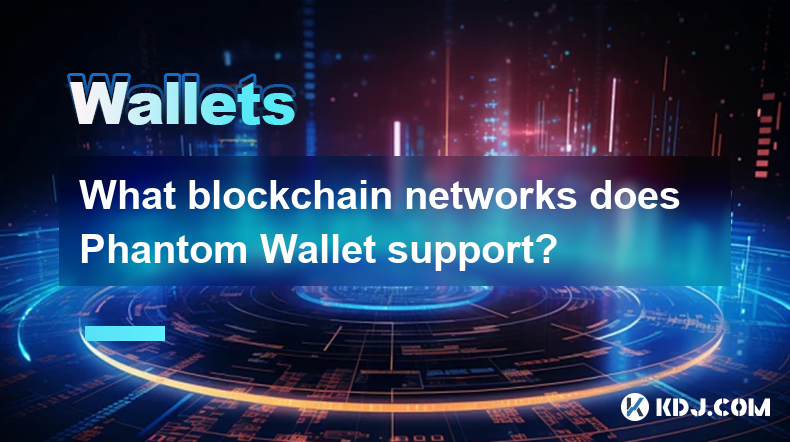
Phantom Wallet is a popular cryptocurrency wallet that primarily focuses on supporting decentralized applications (dApps) and assets on various blockchain networks. As of the latest updates, Phantom Wallet supports several key blockchain networks, each offering unique features and benefits to users. In this article, we will explore the blockchain networks supported by Phantom Wallet, detailing their functionalities and how they integrate with the wallet.
Solana
Phantom Wallet was initially built to support the Solana blockchain, which is known for its high throughput and low transaction fees. Solana's architecture allows for fast and scalable decentralized applications, making it an ideal choice for users looking to engage with DeFi and NFT platforms.
- Solana's Proof of History (PoH) consensus mechanism enables quick transaction processing, which is crucial for users who frequently interact with dApps.
- Integration with Solana allows Phantom Wallet users to manage their SOL tokens and other Solana-based assets seamlessly.
- Support for Solana NFTs is a significant feature, as the Solana ecosystem has seen a surge in NFT projects and marketplaces.
Ethereum
In addition to Solana, Phantom Wallet also supports the Ethereum blockchain, which is the most widely used platform for smart contracts and decentralized applications. Ethereum's robust ecosystem includes a vast array of DeFi protocols, NFT platforms, and other dApps.
- Ethereum's smart contract functionality allows users to interact with a wide range of decentralized applications directly from Phantom Wallet.
- Support for ERC-20 tokens enables users to store, send, and receive a variety of Ethereum-based tokens.
- Integration with Ethereum NFTs is another key feature, as Ethereum hosts some of the most popular NFT projects in the crypto space.
Polygon
Phantom Wallet also supports the Polygon network, which is a layer-2 scaling solution for Ethereum. Polygon aims to provide faster and cheaper transactions while maintaining compatibility with Ethereum's ecosystem.
- Polygon's scalability makes it an attractive option for users looking to engage with Ethereum dApps without the high gas fees.
- Support for Polygon's native token, MATIC, allows users to manage their Polygon assets within Phantom Wallet.
- Integration with Polygon NFTs enables users to explore and interact with NFT projects built on the Polygon network.
Binance Smart Chain
Another blockchain network supported by Phantom Wallet is the Binance Smart Chain (BSC). BSC is known for its low transaction fees and high throughput, making it a popular choice for DeFi and NFT projects.
- BSC's compatibility with Ethereum Virtual Machine (EVM) allows for easy migration of Ethereum dApps to BSC.
- Support for BEP-20 tokens enables users to manage a variety of BSC-based assets within Phantom Wallet.
- Integration with BSC NFTs provides users with access to the growing ecosystem of NFT projects on BSC.
Avalanche
Phantom Wallet also supports the Avalanche blockchain, which is known for its high scalability and fast transaction processing. Avalanche's architecture allows for subnets, which are customizable blockchain networks within the Avalanche ecosystem.
- Avalanche's consensus protocol enables fast and secure transactions, making it suitable for DeFi and NFT applications.
- Support for AVAX tokens allows users to manage their Avalanche assets within Phantom Wallet.
- Integration with Avalanche NFTs provides access to the burgeoning NFT ecosystem on Avalanche.
Fantom
Fantom is another blockchain network supported by Phantom Wallet. Known for its high throughput and low transaction fees, Fantom is designed to support DeFi and other decentralized applications.
- Fantom's Lachesis consensus mechanism enables fast and scalable transactions, making it ideal for DeFi platforms.
- Support for FTM tokens allows users to manage their Fantom assets within Phantom Wallet.
- Integration with Fantom NFTs provides access to the growing NFT ecosystem on Fantom.
Harmony
Phantom Wallet also supports the Harmony blockchain, which is designed to provide fast and secure transactions with low fees. Harmony's sharding technology allows for high scalability, making it suitable for a wide range of decentralized applications.
- Harmony's sharding technology enables fast and scalable transactions, making it ideal for DeFi and NFT platforms.
- Support for ONE tokens allows users to manage their Harmony assets within Phantom Wallet.
- Integration with Harmony NFTs provides access to the NFT ecosystem on Harmony.
Celo
Celo is another blockchain network supported by Phantom Wallet. Known for its focus on mobile-first decentralized applications, Celo aims to provide financial tools to users worldwide.
- Celo's mobile-first approach makes it accessible to a wide range of users, particularly those in emerging markets.
- Support for CELO tokens allows users to manage their Celo assets within Phantom Wallet.
- Integration with Celo NFTs provides access to the NFT ecosystem on Celo.
Moonbeam
Phantom Wallet also supports the Moonbeam network, which is a smart contract platform designed to be compatible with Ethereum. Moonbeam aims to provide a seamless experience for developers and users transitioning from Ethereum to other blockchains.
- Moonbeam's Ethereum compatibility makes it easy for users to interact with Ethereum dApps on the Moonbeam network.
- Support for GLMR tokens allows users to manage their Moonbeam assets within Phantom Wallet.
- Integration with Moonbeam NFTs provides access to the NFT ecosystem on Moonbeam.
Arbitrum
Arbitrum is another blockchain network supported by Phantom Wallet. As a layer-2 scaling solution for Ethereum, Arbitrum aims to provide faster and cheaper transactions while maintaining compatibility with Ethereum's ecosystem.
- Arbitrum's scalability makes it an attractive option for users looking to engage with Ethereum dApps without the high gas fees.
- Support for ETH tokens allows users to manage their Arbitrum assets within Phantom Wallet.
- Integration with Arbitrum NFTs enables users to explore and interact with NFT projects built on the Arbitrum network.
Optimism
Phantom Wallet also supports the Optimism network, which is another layer-2 scaling solution for Ethereum. Optimism aims to provide faster and cheaper transactions while maintaining compatibility with Ethereum's ecosystem.
- Optimism's scalability makes it an attractive option for users looking to engage with Ethereum dApps without the high gas fees.
- Support for ETH tokens allows users to manage their Optimism assets within Phantom Wallet.
- Integration with Optimism NFTs enables users to explore and interact with NFT projects built on the Optimism network.
xDai (now Gnosis Chain)
Phantom Wallet also supports the xDai network, which has been rebranded as the Gnosis Chain. Gnosis Chain is a layer-2 scaling solution for Ethereum, focusing on fast and low-cost transactions.
- Gnosis Chain's scalability makes it an attractive option for users looking to engage with Ethereum dApps without the high gas fees.
- Support for xDAI tokens allows users to manage their Gnosis Chain assets within Phantom Wallet.
- Integration with Gnosis Chain NFTs enables users to explore and interact with NFT projects built on the Gnosis Chain network.
Aurora
Phantom Wallet also supports the Aurora network, which is a layer-2 scaling solution for Ethereum built on the NEAR protocol. Aurora aims to provide fast and low-cost transactions while maintaining compatibility with Ethereum's ecosystem.
- Aurora's scalability makes it an attractive option for users looking to engage with Ethereum dApps without the high gas fees.
- Support for ETH tokens allows users to manage their Aurora assets within Phantom Wallet.
- Integration with Aurora NFTs enables users to explore and interact with NFT projects built on the Aurora network.
Cronos
Phantom Wallet also supports the Cronos network, which is a layer-1 blockchain developed by Crypto.com. Cronos aims to provide fast and low-cost transactions, making it suitable for DeFi and NFT applications.
- Cronos's high throughput makes it ideal for users looking to engage with DeFi and NFT platforms.
- Support for CRO tokens allows users to manage their Cronos assets within Phantom Wallet.
- Integration with Cronos NFTs provides access to the growing NFT ecosystem on Cronos.
Klaytn
Phantom Wallet also supports the Klaytn network, which is a public blockchain developed by Kakao. Klaytn aims to provide fast and low-cost transactions, making it suitable for a wide range of decentralized applications.
- Klaytn's high throughput makes it ideal for users looking to engage with DeFi and NFT platforms.
- Support for KLAY tokens allows users to manage their Klaytn assets within Phantom Wallet.
- Integration with Klaytn NFTs provides access to the growing NFT ecosystem on Klaytn.
Common Questions
Q: Can I use Phantom Wallet to interact with dApps on multiple blockchain networks?
A: Yes, Phantom Wallet supports multiple blockchain networks, allowing users to interact with dApps on Solana, Ethereum, Polygon, Binance Smart Chain, Avalanche, Fantom, Harmony, Celo, Moonbeam, Arbitrum, Optimism, Gnosis Chain, Aurora, Cronos, and Klaytn.
Q: Does Phantom Wallet support NFTs on all the blockchain networks it supports?
A: Yes, Phantom Wallet supports NFTs on all the blockchain networks it supports, including Solana, Ethereum, Polygon, Binance Smart Chain, Avalanche, Fantom, Harmony, Celo, Moonbeam, Arbitrum, Optimism, Gnosis Chain, Aurora, Cronos, and Klaytn.
Q: Are there any fees associated with using Phantom Wallet on different blockchain networks?
A: The fees associated with using Phantom Wallet depend on the specific blockchain network. Each network has its own fee structure, which can vary based on factors such as transaction volume and network congestion.
Q: Can I transfer assets between different blockchain networks using Phantom Wallet?
A: Phantom Wallet does not currently support direct transfers between different blockchain networks. Users would need to use a bridge or a decentralized exchange to move assets between networks.
Q: Is Phantom Wallet secure for managing assets on multiple blockchain networks?
A: Phantom Wallet employs robust security measures to protect users' assets across all supported blockchain networks. However, users should always follow best practices for securing their wallets, such as using strong passwords and enabling two-factor authentication.
Disclaimer:info@kdj.com
The information provided is not trading advice. kdj.com does not assume any responsibility for any investments made based on the information provided in this article. Cryptocurrencies are highly volatile and it is highly recommended that you invest with caution after thorough research!
If you believe that the content used on this website infringes your copyright, please contact us immediately (info@kdj.com) and we will delete it promptly.
- Ruvi AI: Is This Token Gem Delivering Real ROI?
- 2025-07-01 06:30:11
- Bitcoin Price, Robinhood, & BTC Momentum: What's the Deal?
- 2025-07-01 06:30:11
- PNG Membership Soars to Record High: A Deep Dive into Growth and What It Means
- 2025-07-01 06:50:11
- Bitcoin's Breakout to $110K: What's the Real Deal, New York?
- 2025-07-01 06:50:11
- Valhalla Beckons: Norse Mythology Meets Blockchain Gaming
- 2025-07-01 07:10:11
- Valhalla Beckons: Norse Mythology Meets Blockchain Gaming
- 2025-07-01 06:55:12
Related knowledge
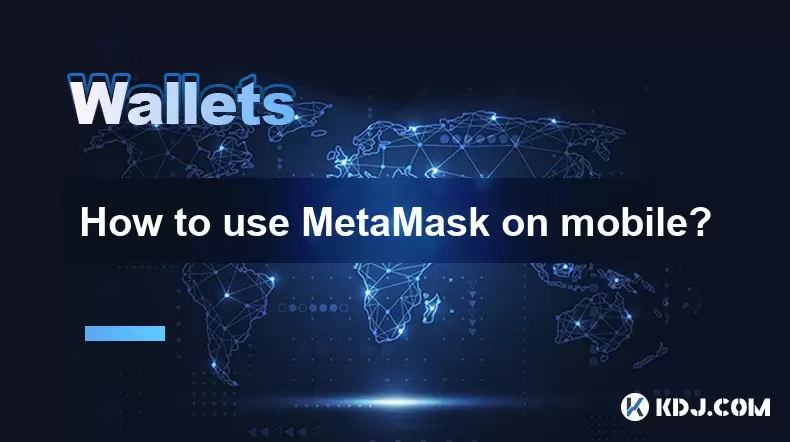
How to use MetaMask on mobile?
Jul 01,2025 at 06:00am
What is MetaMask and Why Use It on Mobile?MetaMask is one of the most widely used cryptocurrency wallets, offering users a secure way to interact with decentralized applications (dApps) on the Ethereum blockchain. While traditionally used as a browser extension on desktops, MetaMask also provides a mobile app, enabling seamless access to your crypto ass...
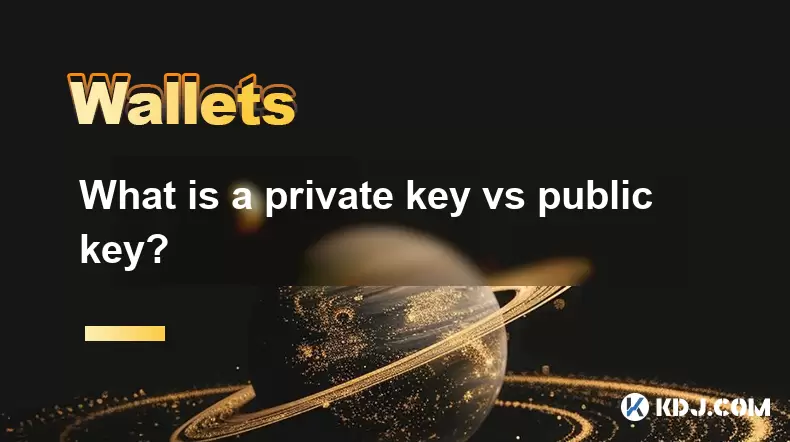
What is a private key vs public key?
Jul 01,2025 at 04:21am
Understanding the Basics of Cryptographic KeysIn the world of cryptocurrencies, the terms private key and public key are foundational. These keys form the backbone of blockchain security and ensure that digital assets remain protected while allowing for transparent transactions. At their core, these keys are part of a cryptographic system known as asymm...
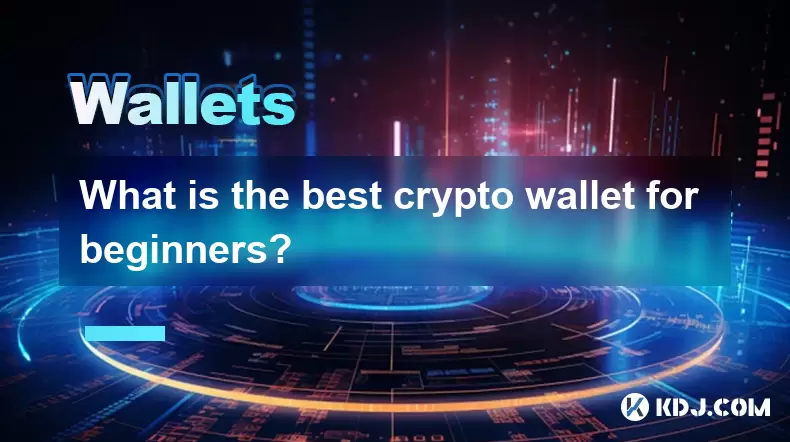
What is the best crypto wallet for beginners?
Jul 01,2025 at 02:42am
Understanding the Basics of Crypto WalletsA crypto wallet is a digital tool that allows users to store, send, and receive cryptocurrencies securely. Unlike traditional wallets that hold physical cash, crypto wallets do not actually store coins. Instead, they manage the private keys that grant access to blockchain addresses where your funds are recorded....
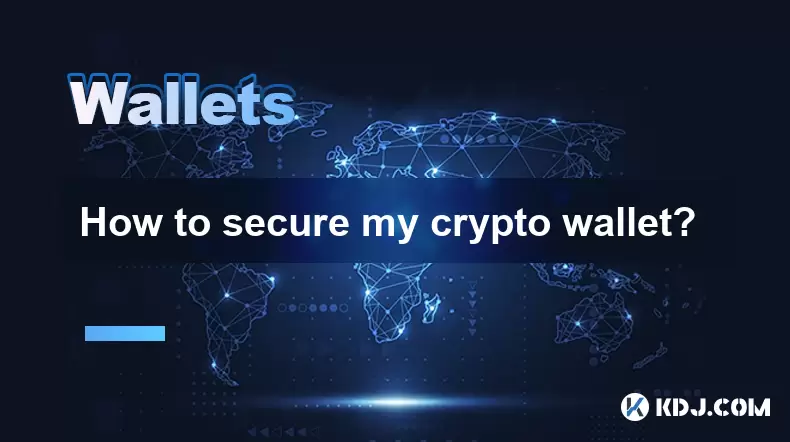
How to secure my crypto wallet?
Jul 01,2025 at 03:28am
Understanding the Importance of Crypto Wallet SecuritySecuring your crypto wallet is a fundamental aspect of managing digital assets. Unlike traditional bank accounts, cryptocurrency wallets do not have centralized institutions to reverse fraudulent transactions or recover lost funds. Therefore, security measures must be proactively managed by the user....
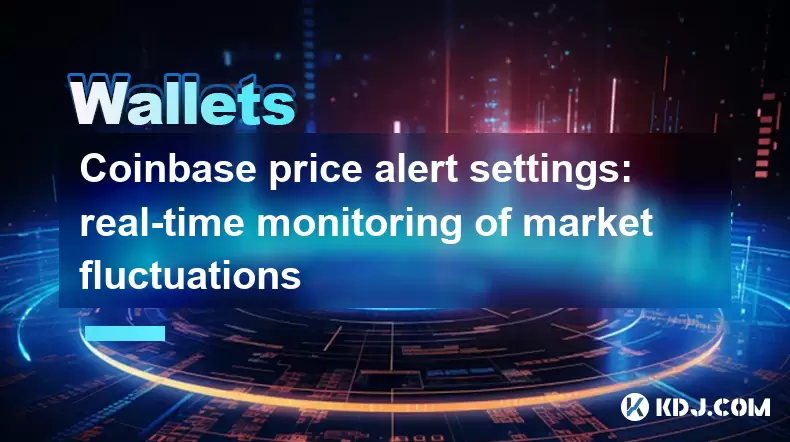
Coinbase price alert settings: real-time monitoring of market fluctuations
Jun 29,2025 at 07:00am
Setting Up Coinbase Price AlertsTo begin real-time monitoring of market fluctuations on Coinbase, users can utilize the built-in price alert feature. This function allows you to receive notifications when a cryptocurrency reaches a specific price point. To access this setting, open the Coinbase app or log in via the web platform. Navigate to the 'Prices...

How to stake cryptocurrencies on Coinbase? Benefits and risks
Jun 27,2025 at 06:36pm
Understanding Cryptocurrency Staking on CoinbaseStaking cryptocurrencies involves locking up digital assets to support the operations of a blockchain network, typically in return for rewards. Coinbase, one of the most popular cryptocurrency exchanges globally, offers staking services for several proof-of-stake (PoS) coins. Users can stake their holdings...

How to use MetaMask on mobile?
Jul 01,2025 at 06:00am
What is MetaMask and Why Use It on Mobile?MetaMask is one of the most widely used cryptocurrency wallets, offering users a secure way to interact with decentralized applications (dApps) on the Ethereum blockchain. While traditionally used as a browser extension on desktops, MetaMask also provides a mobile app, enabling seamless access to your crypto ass...

What is a private key vs public key?
Jul 01,2025 at 04:21am
Understanding the Basics of Cryptographic KeysIn the world of cryptocurrencies, the terms private key and public key are foundational. These keys form the backbone of blockchain security and ensure that digital assets remain protected while allowing for transparent transactions. At their core, these keys are part of a cryptographic system known as asymm...

What is the best crypto wallet for beginners?
Jul 01,2025 at 02:42am
Understanding the Basics of Crypto WalletsA crypto wallet is a digital tool that allows users to store, send, and receive cryptocurrencies securely. Unlike traditional wallets that hold physical cash, crypto wallets do not actually store coins. Instead, they manage the private keys that grant access to blockchain addresses where your funds are recorded....

How to secure my crypto wallet?
Jul 01,2025 at 03:28am
Understanding the Importance of Crypto Wallet SecuritySecuring your crypto wallet is a fundamental aspect of managing digital assets. Unlike traditional bank accounts, cryptocurrency wallets do not have centralized institutions to reverse fraudulent transactions or recover lost funds. Therefore, security measures must be proactively managed by the user....

Coinbase price alert settings: real-time monitoring of market fluctuations
Jun 29,2025 at 07:00am
Setting Up Coinbase Price AlertsTo begin real-time monitoring of market fluctuations on Coinbase, users can utilize the built-in price alert feature. This function allows you to receive notifications when a cryptocurrency reaches a specific price point. To access this setting, open the Coinbase app or log in via the web platform. Navigate to the 'Prices...

How to stake cryptocurrencies on Coinbase? Benefits and risks
Jun 27,2025 at 06:36pm
Understanding Cryptocurrency Staking on CoinbaseStaking cryptocurrencies involves locking up digital assets to support the operations of a blockchain network, typically in return for rewards. Coinbase, one of the most popular cryptocurrency exchanges globally, offers staking services for several proof-of-stake (PoS) coins. Users can stake their holdings...
See all articles

























































































